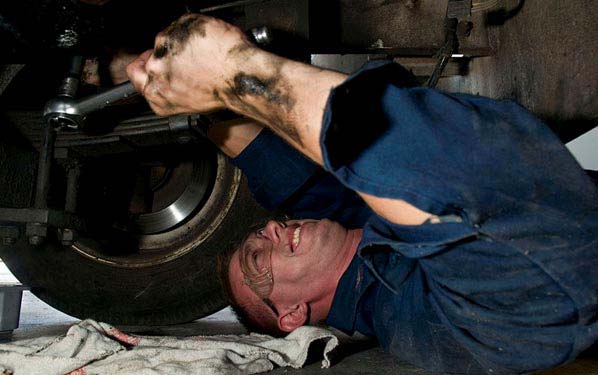
A mechanic performs a routine oil change
Protect Your Car Against Summer
You may not think that summer weather can have much of an impact on your car’s overall health and performance, but the heat can be just as taxing as the cold. Fortunately, there’s a simple way to give your car an advantage: routine inspections. Here’s everything you need to know about summer car maintenace before entering the hottest season.
Air Conditioning
Of course, checking your A/C is the first thing on the list. You haven’t used it in a while, and if it’s broken or performing poorly, you’ll want to get it fixed right away. Diagnosing the unit is easy to do, but because the system is complex, repairs are generally best left to a technician or mechanic.
Cooling System
Keeping your car cool is just as important as keeping you cool. Engines overheating is the number-one cause of breakdowns during the summer months. Your entire coolant system should be both flushed and refilled every 24 months, and the level, concentration, and condition of the coolant in the system should be checked periodically.
If you are checking the coolant yourself, do not remove the radiator cap until the engine has completely cooled! Other routine checkups (belts, clamps, hoses) should be checked by a technician.
Oil Change
Be sure to change your oil and oil filter regularly, as specified by your car’s owner’s manual (the frequency differs depending on the make and model of the car you drive). If you do a significant amount of stop-and-go driving (long trafficky commutes) or go on short drives regularly, you may want to change it even more frequently (every 3,000 miles).
Engine Performance
Your engine contains several filters that each need replacing at different intervals (air, fuel, PVC). If you drive in dusty conditions – desert climates, perhaps – you will want to check and replace more often than recommended in your owner’s manual. Any driving issues, such as idling, stalling, or loss of performance, should be addressed and fixed by a mechanic.
Windshield Wipers
You may not think that the warmer, less-rainy months can take a toll on your wiper blades, but the hot air can dry and crack them, making them ineffective. Check them out monthly to prevent performance issues. You don’t want to find out they aren’t working while you’re driving.
Lights
Inspect for any dirt residue or buildup. Clean with a moist cloth, as a dry cloth can leave scratches that will affect visibility. Replace any dim or burnt out bulbs.
Tires
Every 5,000 miles you should have your tires rotated. This will ensure they wear down evenly, and that you will get the most efficient performance from them. Once a month, check the pressure on all tires (check before driving to get the most accurate reading). Examine the tires closely for tread wear. Look for worn spots, bald patches, radials poking through. Also check the sidewalls for nicks, cuts, or cupping. Be sure to also inspect your spare tire and your jack.
Brakes
If you feel any sort of softness or pulsing when you apply pressure to your brakes, get them checked out immediately. You also need to have them inspected as recommended in your manual. Oftentimes, minor problems can be fixed before they become major problems.
Battery
Your car’s battery doesn’t necessarily have a season that affects its performance, but without it your car isn’t going anywhere, so it’s best to check it routinely. A mechanic will have the tools necessary to inspect the output of the battery, to ensure it is performing well, but most people can perform simple preliminary inspections, simply by looking. Keep an eye out for any signs of corrosion or loss of fluid (if the battery caps are removable). Always wear rubber gloves and eye protection, and avoid contact with corrosion or battery acid.
A quick routine inspection before the hot summer months can keep your car performing strong, regardless of the heat.










